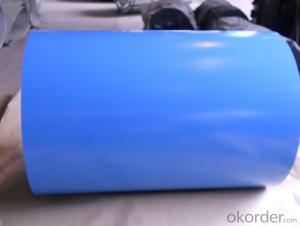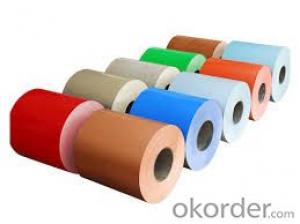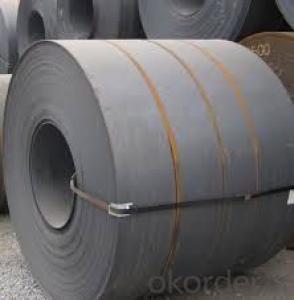PREPAINTED GALVANIZED STEEL COIL
- Loading Port:
- Shanghai
- Payment Terms:
- TT OR LC
- Min Order Qty:
- -
- Supply Capability:
- 10000 m.t./month
OKorder Service Pledge
Quality Product, Order Online Tracking, Timely Delivery
OKorder Financial Service
Credit Rating, Credit Services, Credit Purchasing
You Might Also Like
PREPAINTED GALVANIZED STEEL COILS
ZINC COATING:60g/m2 (-/+10g/m2)
COLOR: ACCORDING TO COLOR SAMPLE.
TOP COATING:5+13 MICRON, BACK COATING:5-7 MICRON;
COIL WEIGHT:3-5 ton
STANDARD:JIS G 3312
STEEL GRADE:CGCC
COIL ID:508mm
SIZE(MM):
0.25MM*1250MM*C
0.30MM*1250MM*C
0.35MM*1000MM*C
0.40MM*1250MM*C
MIN.ORDER:50TON
PRODUCTION TIME:30DAYS AFTER RECEIVED DOWN PAYMENT OR CORRECT LC.
TOLERANCE:WIDTH 0,+3 MM,THICKNESS:+/-0.02MM,ZINC COATING:+/-15G/M2.COATING:-/+2MIC.
- Q:How do steel coils contribute to the agricultural machinery industry?
- Due to their versatile and durable nature, steel coils play an essential role in the agricultural machinery industry. They are used in various applications and contribute significantly to improving the efficiency and productivity of agricultural machinery. Manufacturing equipment frames and structures is one primary way steel coils contribute to the agricultural machinery industry. These frames provide the necessary strength and stability to withstand the demanding conditions of agricultural operations. Whether it's tractors, harvesters, or tillers, steel coils are utilized to create robust and rigid frames capable of handling heavy loads, vibrations, and impacts. Moreover, steel coils are vital in fabricating components like plow blades, cultivator tines, and seed drills. These components are crucial for soil preparation, seed planting, and crop maintenance. Steel coils provide the necessary strength and resistance to wear and tear, ensuring these components can endure the rigors of agricultural operations and have a prolonged lifespan. Additionally, steel coils are used in manufacturing hydraulic systems and other moving parts in agricultural machinery. These systems are responsible for powering and controlling various functions such as lifting, lowering, and steering. Steel coils provide the necessary strength and flexibility for these systems to function optimally, ensuring smooth and efficient operation of agricultural machinery. Furthermore, the use of steel coils in the construction of agricultural machinery enhances equipment safety and longevity. Steel is renowned for its excellent resistance to corrosion, rust, and extreme weather conditions. By incorporating steel coils in the manufacturing process, equipment remains durable and reliable even in harsh environments, ultimately reducing maintenance costs and improving the overall lifespan of the machinery. In conclusion, the agricultural machinery industry heavily relies on steel coils. Their versatility, strength, and durability are indispensable for manufacturing equipment frames, components, hydraulic systems, and other moving parts. By utilizing steel coils, the agricultural machinery industry can produce robust and efficient equipment capable of withstanding demanding agricultural operations, improving productivity, enhancing safety, and extending the lifespan of the machinery.
- Q:What are the dimensions of steel coils used in the metal container industry?
- The dimensions of steel coils used in the metal container industry can vary depending on the specific requirements of the industry and the type of container being produced. However, typical dimensions for steel coils used in this industry range from 0.3mm to 3mm in thickness and 600mm to 2000mm in width. The coils are typically wound in a continuous spiral shape, with diameters ranging from 600mm to 1500mm. These dimensions allow for efficient production and handling of the steel coils during the manufacturing process of metal containers.
- Q:I went to the store to get metal to make a knife and they had weldable steel and plate steel. Which one would be best/ which steels would be best for what i want to do?
- Weldable steel is a generic term for steel with low carbon content which makes it easy to weld, form, and machine. If you're looking for a knife blade material, you need either a stainless steel or a high carbon steel which is not at all weldable. The more carbon in steel, the better it responds to heat treatment like hardening, tempering, etc. Plus, the high carbon steel will hold an edge better. Hope this helped.
- Q:This question is directed to anyone who has played or know someone who plays a lap or pedal steel guitar.I've been a guitarist for about 8 years now and have played a variety of styles from rock, fingerstyle/classical, singer/songwriter acoustic stuff, ect, and now I've really had an interest in learning how to play a lap steel or pedal steel guitar. I am completely new to the instrument(s), so I'm seeking all the information I can. I do know that a pedal steel is a lot more expensive, so I'm probably looking to start on a lap steel for now. Basically how should I get started? Should I find a cheap lap steel at a pawn shop or purchase something new? Are there any good method books out there? I'm a pretty experienced guitarist, so should I expect to get the hang of it quickly? Is there much of a market for a lap/pedal steel player? haha.Also, I am left handed. How much trouble would it be to re-string a steel guitar? Or would I be better off getting a left-handed model?
- Hello okorder / I'm not familiar with the brand...it's certainly not commonly played....but it has the features you need for a starter guitar.
- Q:how much pressure can steel withstand? and how much pressure can concrete withstand? per m3 or cm3? thanks
- No particular answer because it relies upon on: the width of the wall the scale no matter if the wall itself contributes to the 12tonnes load, yet in ordinary maths, you may have any blend of width as against length: 1m huge by using 2.ninety 4 m lengthy 0.5m huge by using 5.88m lengthy etc etc it isn't so ordinary as this in spite of the indisputable fact that.....for causes said above
- Q:What are the common coil surface treatments available for steel coils?
- Steel coils can be treated with various methods to improve their durability, resistance to corrosion, and appearance. These treatments serve different purposes and offer different benefits. 1. Galvanized Coating: A layer of zinc is applied to the surface of the steel coil, providing excellent protection against corrosion. This coating is commonly used in outdoor applications or high humidity environments to prevent rust and increase the coil's lifespan. 2. Phosphating: A chemical treatment that creates a thin layer of phosphate coating on the steel coil's surface. This treatment improves the adhesion of subsequent coatings and enhances the coil's paintability. It also offers some corrosion resistance and can be used as a pre-treatment before painting or powder coating. 3. Chromate Conversion Coating: Also known as chem film or Alodine, this treatment involves applying a thin layer of chromate to the steel coil's surface. It provides corrosion protection and acts as a primer for other coatings, improving their adhesion. It is commonly used in aerospace and electrical applications. 4. Powder Coating: In this dry finishing process, a fine powder is electrostatically applied to the steel coil's surface and then cured under heat. The result is a durable and attractive finish that offers excellent resistance to chipping, scratching, and fading. Powder coating is available in a wide range of colors and textures, making it a versatile option. 5. Organic Coatings: Liquid paints such as acrylic, polyester, or polyurethane are applied to the steel coil's surface. These coatings provide aesthetic appeal, protection against corrosion, and resistance to weathering and UV radiation. They are commonly used in architectural and automotive applications. 6. Anodizing: Primarily used for aluminum coils, anodizing can also be applied to steel coils. This treatment involves creating an oxide layer on the coil's surface through an electrochemical process. It enhances corrosion resistance and provides an attractive finish. Anodizing is commonly used in architectural and decorative applications. It's important to consider specific requirements, including performance, aesthetics, and environmental factors, when choosing a coil surface treatment. Consulting with a professional in the steel industry can help determine the most suitable treatment for a particular project.
- Q:How are steel coils used in the manufacturing of telecommunications equipment?
- Steel coils are used in the manufacturing of telecommunications equipment as they are commonly used as a raw material for various components, such as enclosures, cabinets, and brackets. The coils are processed and shaped to create the necessary parts that provide structural support, protection, and stability to the telecommunications equipment.
- Q:How do steel coils compare to stainless steel coils?
- Steel coils and stainless steel coils are both widely used in various industries for their strength and durability. However, there are some key differences between the two that should be considered when choosing the appropriate material for a specific application. One of the main distinctions between steel coils and stainless steel coils is the composition of the materials. Steel coils are made primarily of iron and carbon, with other elements added to enhance specific properties. On the other hand, stainless steel coils are made of iron, carbon, and a significant amount of chromium, which gives them their unique corrosion-resistant properties. Due to the presence of chromium, stainless steel coils offer superior resistance to corrosion, tarnishing, and rust compared to regular steel coils. This makes stainless steel coils particularly suitable for applications in environments with high humidity, moisture, or exposure to corrosive substances. In contrast, steel coils are more prone to rust and may require additional protective coatings or treatments to prevent corrosion. Another significant difference is the appearance of the two materials. Stainless steel coils have a shiny and reflective surface, giving them an aesthetically pleasing look. They are commonly used in applications where appearance is important, such as kitchen appliances, architectural structures, or decorative purposes. Steel coils, on the other hand, have a matte or dull finish and are often used in industrial applications where appearance is not a primary concern. In terms of strength, both steel and stainless steel coils offer excellent mechanical properties. However, stainless steel coils generally exhibit higher tensile strength and greater resistance to high temperatures. This makes them suitable for applications that require strength, such as construction, automotive, or aerospace industries. Lastly, cost is a factor that should be considered when comparing steel coils to stainless steel coils. Steel coils are generally more cost-effective than stainless steel coils due to the lower cost of raw materials and simpler manufacturing processes. However, when the added value of corrosion resistance and longevity is taken into account, stainless steel coils may prove to be a more economical choice in the long run, as they require less maintenance and replacement. In conclusion, steel coils and stainless steel coils have different properties and characteristics that make them suitable for specific applications. Stainless steel coils offer superior corrosion resistance, a shiny appearance, and higher tensile strength, while steel coils are more cost-effective. The choice between the two ultimately depends on the specific requirements of the application, such as the environment, aesthetics, strength, and budget.
- Q:Can cold rolled galvanized steel coils be acid washed after oxidation?
- If it has been galvanized, it can not be pickled, and if it is pickled, it may corrode the zinc layer
- Q:which one(glass or steel)has more power and velocity? im planning on using my slingshot for hunting.
- definitely steel. i used to hit bullseyes with a good slingshot, and you need heavy, perfectly spherical small steel shot. smaller than a marble, bigger than a bb.
1. Manufacturer Overview |
|
|---|---|
| Location | |
| Year Established | |
| Annual Output Value | |
| Main Markets | |
| Company Certifications | |
2. Manufacturer Certificates |
|
|---|---|
| a) Certification Name | |
| Range | |
| Reference | |
| Validity Period | |
3. Manufacturer Capability |
|
|---|---|
| a)Trade Capacity | |
| Nearest Port | |
| Export Percentage | |
| No.of Employees in Trade Department | |
| Language Spoken: | |
| b)Factory Information | |
| Factory Size: | |
| No. of Production Lines | |
| Contract Manufacturing | |
| Product Price Range | |
Send your message to us
PREPAINTED GALVANIZED STEEL COIL
- Loading Port:
- Shanghai
- Payment Terms:
- TT OR LC
- Min Order Qty:
- -
- Supply Capability:
- 10000 m.t./month
OKorder Service Pledge
Quality Product, Order Online Tracking, Timely Delivery
OKorder Financial Service
Credit Rating, Credit Services, Credit Purchasing
Similar products
New products
Hot products
Hot Searches
Related keywords





























